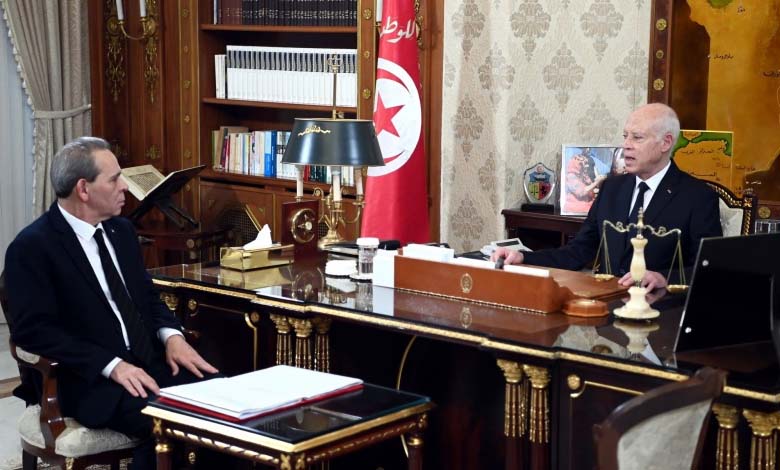Saied accuses Zionist movements of being behind the smuggling of terrorists
Tunisian President confirms that the operation to smuggle terrorists out of the Monastir prison was planned months ago to destabilize the state

Tunisian President Kais Saied asserted on Wednesday that the escape of five inmates involved in “terrorist” cases on Tuesday was a “smuggling” operation that had been planned for months, pointing to the role of Zionist movements in the operation. He stated that this was a punishment for Tunisia’s stance on the Palestinian issue and its refusal to target the Gaza Strip. He called for a thorough review of appointments in the security agencies to counter infiltrations.
In a video released by the presidency following his meeting with Interior Minister Kamal El-Faqi, he said, “The smuggling operation that took place on Tuesday was not an escape… all the evidence indicates that the operation was planned long ago.”
On Tuesday, the Tunisian Ministry of Interior announced the escape of five inmates involved in “terrorist” cases from the Mornaguia prison, one of the largest prisons in the country, urging citizens to report any information about them.
The President of Tunisia, during his meeting with the Minister of Justice, Leïla Jaffel, at the Carthage Palace on Wednesday, called for a swift investigation into those responsible for the escape, especially those who planned it, whether from within or outside the prison. The authorized investigations should not only identify responsibilities within the prison but also pinpoint responsibilities outside it, as such an operation could only have occurred through planning by parties that are not behind bars and should be subject to legal prosecution.
Furthermore, as reported by the Presidency, he stressed the necessity for judges to fully fulfill their responsibilities in addressing the cases brought before them. It is unreasonable for cases related to national security or embezzlement of public funds to remain pending for years without resolution.
During his meeting with Prime Minister Ahmed Hachani, Saied emphasized the need to expedite the auditing of appointments within all state institutions, which not only represents a waste of public funds but also jeopardizes national security.
In a statement released by the presidency, he stressed “what happened on Tuesday in the smuggling operation of several prisoners demonstrates the seriousness of these appointments. Moreover, some entities are connected to external circles with no purpose other than targeting the state and its domestic peace because these circles do not accept any national system but only seek a formal and deceptive democracy controlled by lobbies and agents.
Appointments in Tunisian institutions, especially sensitive security agencies, over the past decade have posed a significant challenge to President Saied’s comprehensive reform efforts aimed at freeing state institutions from partisan influence.
During the past decade, appointments in state agencies were subject to patronage and loyalties to the previous ruling system, particularly Ennahdha, which facilitated the presence of extremists and individuals with criminal backgrounds in sensitive. Many security unions warned against this, while the President repeatedly called for cleansing the administration and institutions.
Despite strict security and legal measures regarding appointment criteria for the security and prison institutions, there have been concerns about the intellectual backgrounds and potential radicalization of appointees. However, these rules were bypassed with political forces gaining control of the Ministry of Interior after the revolution.
The dissolution of the State Security Apparatus also represented an alternative to reform it from the mistakes made after the revolution, given its role in protecting national security and monitoring those involved in terrorism.
In a separate statement on Tuesday evening, the Interior Ministry announced the dismissal of two security officials, the director-general of specialized services, and the central director of public intelligence. The Ministry of Justice also removed the prison director, as reported by the public media.
Reports suggested the discovery of security uniforms at the location from which the group escaped, but experts confirmed that it is difficult for terrorists to escape through the prison’s heavily fortified iron bars.
The President’s mention of external complicity is not ruled out, according to observers, as Israeli media reports in the past have discussed internal collusion with the Mossad in the assassination of Mohamed Zouari.
Tunisia is considering passing a law criminalizing normalization, which would penalize anyone who communicates with the Israeli side, but the session has been postponed to Thursday amid criticisms of the law’s potential impact on Tunisian interests.
Among the escapees is Ahmed Al-Maliki (44 years old), known as “Al-Somali,” who has been imprisoned since 2014 for his involvement in “terrorist” cases, including the assassination of opposition politicians.
On February 6, 2013, leftist opposition figure Chokri Belaid was assassinated in the Tunisian capital, leading to a political crisis.
The judiciary opened an investigation at the time, but no verdicts have been issued to this day, not even in the case of the assassination of former parliamentarian Mohamed Brahmi on July 25, 2013.
The Civilian Prison of Mornaguia is one of the largest prisons in the country, housing inmates involved in criminal cases, jihadists, and opposition detainees critical of President Kais Saied.
Tunisia has witnessed an increase in the activities of jihadist groups since 2012, carrying out armed attacks that targeted numerous security personnel, military personnel, and tourists. In recent years, their activities have been concentrated in the mountainous regions of western Tunisia.












